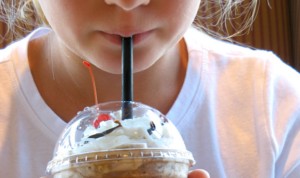Kids and Caffeine: What are the Risks?
At many coffee shops, the traditional breakfast beverage looks more like dessert. Kids’ consumption of coffee-based drinks is on the rise; they’re also consuming other caffeinated beverages like soda, tea and energy drinks.
The growing market and availability of caffeinated beverages make Americans even more likely to consume them in lieu of other vital fluids necessary to a healthy diet, explains Stanley Grogg, DO, an AOA board-certified pediatrician in Tulsa, Oklahoma.
“Children are choosing soda instead of water, juice and milk, even though the latter are essential elements of their diets,” says Dr. Grogg.
Drinking caffeine can lead to headaches, dehydration and slower calcium absorption.
In addition, parents often forget that caffeine is a drug, and children who drink 3-4 caffeinated beverages a day will experience some form of withdrawal such as headaches, fatigue and muscle aches if they haven’t had their “daily fix.”
In addition, caffeine, even in moderate doses, can cause the following health issues:
- Insomnia
- Fatigue
- Headaches and muscle aches
- Dizziness
- Irritability
- Dehydration
- Slower absorption of calcium
Also, it’s important to note that caffeinated beverages act as a strong diuretic. Consequently, allowing your child a caffeinated drink before bedtime will ensure at least one nighttime trip to the bathroom.
Monitoring Caffeine Intake
Only parents can determine how much caffeine is too much for their children, but Dr. Grogg advises parents to monitor the content of their children’s preferred beverages. For a quick review of the caffeine content in common beverages, refer to the table below.
Beverage total caffeine content (milligrams)
- 8 oz. mocha—90 mg
- 8 oz. iced tea—30 mg
- 8.5 oz. Red Bull—80 mg
- 12 oz. Coca-Cola—35 mg
- 12 oz. Mountain Dew—55 mg
- 12 oz. vanilla Frappuccino—65 mg
- 16 oz. Monster Energy—160 mg
Tips for Parents
To keep your children happy and help prevent caffeine addiction, Dr. Grogg suggests the following:
- Watch your children’s caffeine intake. Discourage them from drinking more than one soda a day or super-sizing their drink.
- Give your children an appealing alternative. Have milk or water readily available.
- Don’t try to substitute diet soda for regular. Diet may have less sugar, but it actually contains more caffeine.
“Remember that your children watch your behavior and the healthy choices you make,” says Dr. Grogg. “Talk with them about the importance of drinking plenty of water and being aware of how many caffeinated beverages they drink each day.”
